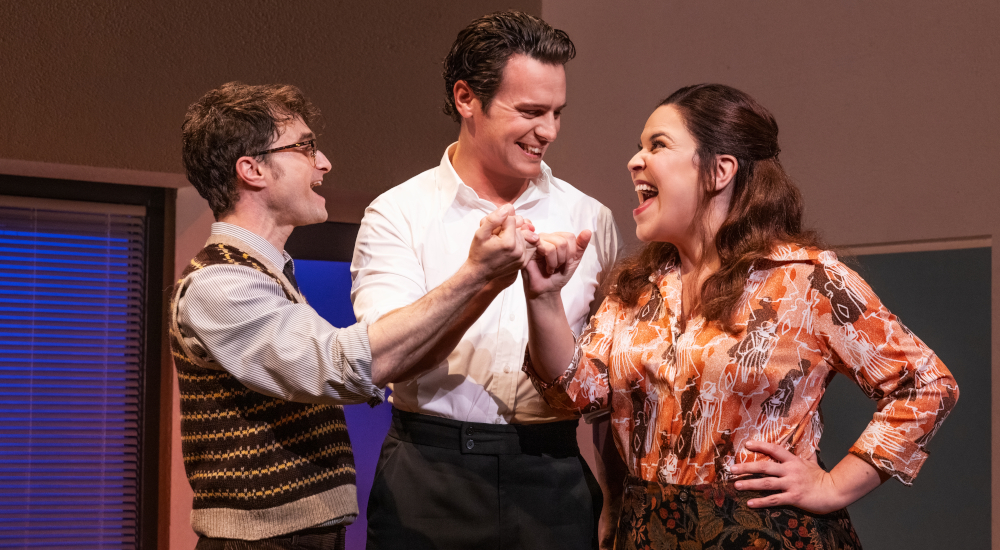“It’s fait that brought us together.”
Attempting to capture the unique energy of a Broadway production and project it onto the big screen is a difficult task. There is a reason the two visual mediums rarely harmonize. And while the revival of Stephen Sondheim's Merrily We Roll Along was a massive success during its painfully short run at the Hudson Theatre, during its transfer, the show's emotional impact is lost somewhere behind the lens.
Maria Friedman serves as director of both stage and screen. The film, a live recording from June 2024, aims to bring the theatre to a broader audience, celebrating the musical that most didn't appreciate when it first hit the stage in 1981. And while the production undoubtedly embodies the world Sondheim and book writer George Furth envisioned, it takes too much control of the viewer's attention, withholding the stage-encompassing spectacle from those watching on.
Jonathan Groff stars as Franklin Shepard, a composer who, as the bills pile up around him, leans into the possibility of commercial success. Told in reverse order, we follow Franklin's deteriorating relationship with his two best friends, lyricist and collaborator Charley Kringas (Daniel Radcliffe) and writer Mary Flynn (Lindsay Mendez).
Beautifully shot from start to finish, the film boasts crisp audio and visuals that deliver a truly remarkable capture of one of the decade's most successful revivals. And though audiences have begun to come around to the once panned Sondheim production, the film fails to capture the newly minted spark as Friedman overcommits to the close-up, consistently trading stage optics for tight, intimate shots.
Fronted by a trio of awe-inspiring performances, many moments of brilliance go unnoticed as we pan away from a reaction to focus on the speaker. While this traditionally works in film, theatre fans will be frustrated by the limited accessibility to the show's many prevalent players.
Moreover, Friedman's obsession with keeping the speaker in center frame becomes monotonous as we work our way back in time. The decision forces our attention to the primary place of action, as set design and stage presentation invariably get lost off-screen.
That said, it's hard to find fault in the story or the performances. All three key actors received Tony nominations for their work, with both Groff and Radcliffe taking home the highly coveted trophy. Their performances, as one would expect, are flawless as they maneuver their way through three decades of friendship, each segment leading back to the one before it. The delivery is unique, allowing a handful of revelations to arise as audience members get multiple opportunities to place the pieces that ultimately form the large-scale puzzle.
That puzzle, at its core, is strong. Boasting bright colors of brilliance, the film's central message is sound. And those who understand the theatre will likely have a basis for how things are shaping on stage. But Friedman does little to assist those who are coming in cold. And while the film is a captured stage performance, in much the same way The Producers fell flat in 2005, sticking strictly to the front-of-house view doesn't resonate on the big screen like it does from the crammed seats of a Broadway venue.
While I will always welcome an attempt to bring Broadway to Hollywood, Merrily We Roll Along reminds us that most stage productions are not ready for the big screen. And though I won't stoop to calling this release a blatant cash grab, its cookie-cutter approach leaves much to be desired. Theatre fans are some of the hardest to please. And maybe this film isn't made for them. But most will struggle with the lack of creativity. Especially with the editing. It falls well short of showcasing Broadway's true appeal.

